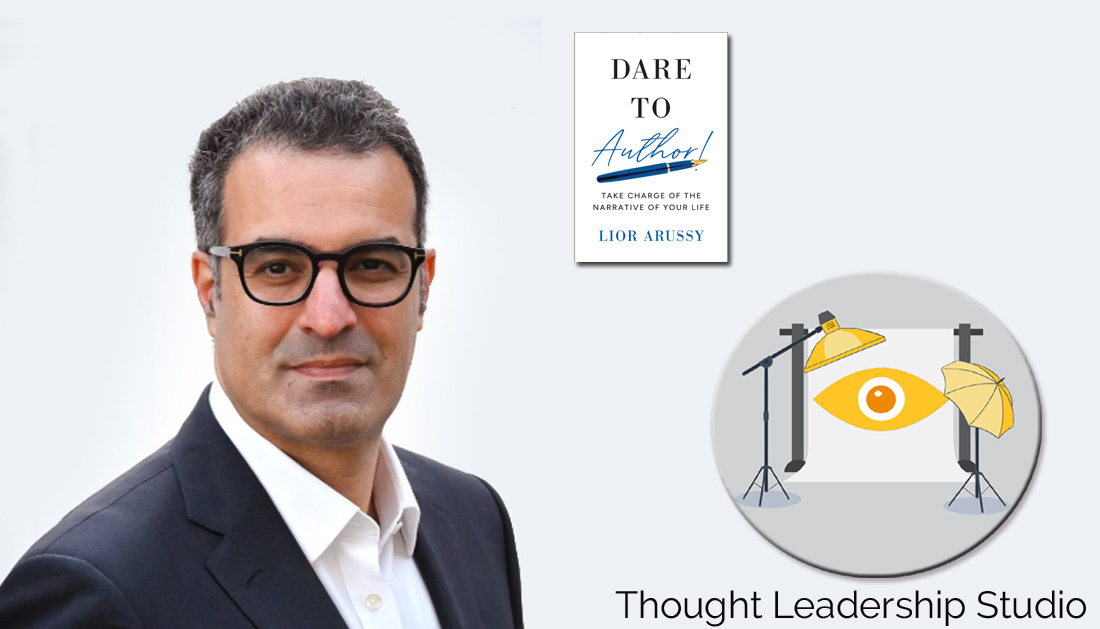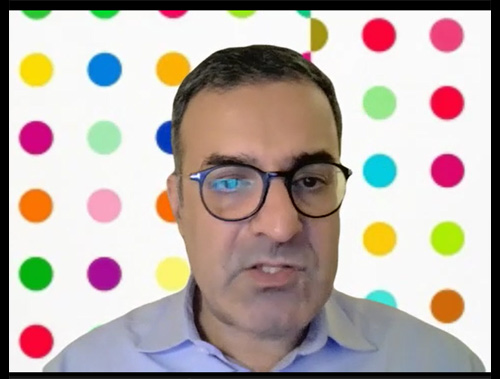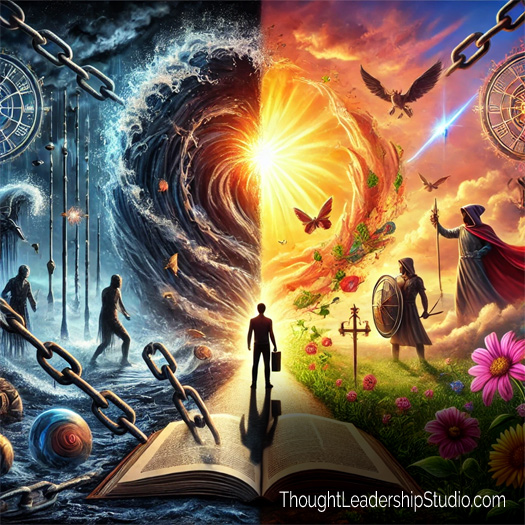Thought Leadership Studio Podcast Episodes:
Scripting Your Story with Lior Arussy
Episode 89 - Transforming Leadership Through Storytelling: Lior Arussy on Thriving Beyond Resistance, Unlocking Resilience, and Embracing Change with Authenticity

#authors, #branding, #coaching, #communication, #consulting, #creativity, #customerexperience, #inspiration, #interview, #interviews, #leadership, #marketing, #motivation, #paradigmshifts, #personalbranding, #persuasion, #storytelling, #strategicthoughtleadership, #thoughtleadership
Or Click here to listen or subscribe on appWhat this episode will do for you
:- Understand the Shift in Leadership Styles: Learn why the "invincible leader" mindset is outdated and how collaborative storytelling can engage and inspire teams more effectively.
- Process the Past to Embrace the Future: Discover how leaders can help their teams evolve by turning past experiences into tools for resilience and future success.
- Overcome Pushback and Cynicism: Gain strategies to address resistance to change and foster a culture of growth and adaptability.
- Leverage the Power of Personal Stories: Explore how accessing and authoring your life’s chapters can unlock resources and strengthen leadership capacity.
- Embrace Gratitude for Greater Energy: Understand the impact of the “gratitude denial syndrome” and how accepting positive feedback fuels future achievements.
- Practical Tools for Thriving Through Change: Take away actionable insights for scripting your story, empowering teams, and leading through transformation with authenticity.
Lior Arussy.
In this episode, I’m excited to introduce Lior Arussy, a renowned expert in customer experience and strategy execution.
Strategic Thought Leadership inspires others through positive influence and new thinking, and Lior’s work exemplifies this by helping leaders reframe their stories and embrace collaboration to drive change.
Lior is an award-winning consultant, speaker, and author of 10 books, including DARE to Author, with clients including Mercedes-Benz, FedEx, and MasterCard. He emphasizes the power of moving beyond the "invincible leader" mindset, helping leaders engage employees (and audiences) with authenticity and vision.
We discuss overcoming pushback, accessing personal history to build resilience, and thriving through change. Lior also shares actionable insights on empowering leaders to script their stories and turn past experiences into tools for future challenges.
Some of Lior's coordinates:
Curated Transcript of Interview with Lior Arussy
The following partial transcript is lightly edited for clarity - the full interview is on audio. Click here to listen.
Chris McNeil: I'm Chris McNeil, with Thought Leadership Studio, and I'm sitting here across the Atlantic Ocean via Zoom with Lior Arussy, who is an investor strategy accelerator speaker and award-winning consultant, known as one of the world's leading authorities on customer experience and strategy execution. He has helped some of the world's leading brands such as Mercedes-Benz, Delta Airlines, Walmart, FedEx, Johnson and Johnson, and MasterCard to author the next chapter in their success. He's the author of DARE two author and has written seven previous books, including Next is Now Excellence Every Day, innovating It, customer Experience, strategy, exceptionalized It, and Passionate and Profitable. Great to have you here, Lior.
 Lior Arussy: Well, thank you very much Chris for having me.
Lior Arussy: Well, thank you very much Chris for having me.
Chris McNeil: That's quite a background and as we were talking about before we started recording, I am fascinated by the positioning of your book, Dare to Author. And we were just talking about some of the distinctions in leadership. Now, do you care to share some of that with our listeners?
Redefining Leadership: From Invincibility to Storytelling
Lior Arussy: Sure. So I think many leaders have been in the business for several decades and they are tending to mirror their first manager's leadership style. So as a result of it, 30 years ago, a lot of leaders acted like the invincible leader. They have all the answers to all the questions. You just come to me and I'll tell you what to do. And there was an aura of I would say, absolute authority. And we tend to mirror that today.
 The problem is our employees have changed. And the second thing is that that aura of invincible leader is actually creating a counter reaction where people do not want to follow somebody who knows all the answers. So if your aura is, I know all the answers, you just follow the orders. Well, guess what? Today's employees are not going to do that. And what I'm doing in the book is I'm teaching people how to use storytelling and personal stories to engage people and to create them as people who wants to join you.
The problem is our employees have changed. And the second thing is that that aura of invincible leader is actually creating a counter reaction where people do not want to follow somebody who knows all the answers. So if your aura is, I know all the answers, you just follow the orders. Well, guess what? Today's employees are not going to do that. And what I'm doing in the book is I'm teaching people how to use storytelling and personal stories to engage people and to create them as people who wants to join you.
Because here's a very simple fact. Leaders especially in business setting, are using numbers and facts in order to try to mobilize their people. It doesn't work. In fact, we conducted a study several years ago with Howard Business Review where we benchmark 422 companies and we asked them, how successful are your change programs? You're trying to transform to something, whatever it is, how successful are you? And only 9% claim that they've been successful out of a hundred percent.
Now, if you substitute Chris the word change with the word future, you understand this is major risk. If you cannot move towards the future, you're going to lose relevance, you're going to lose margins, you're going to lose your customers. So then we ask them, so what's the reason? What's the root cause? Is it technology? Is it governance? Is it budget?
The number one reason is people reaction to change people, we tend to respond to change with a sense of victimhood as opposed to a sense of opportunity. And my message to leadership is by you moving to actually daring to author the story and sharing those stories with your people, you are opening their hearts and minds to say, I don't know all the answers. I'm just like you a human being. I have a very clear conviction about the vision, but I'm going to work together with you. Please join me on a journey. It's a different style than coming and saying, here are the facts, go and do that. Because ultimately people are mobilized and activated by stories, not by facts.
Chris McNeil: That's powerful. And I think you brought the example of leading companies internal leadership, which would apply to market leadership and for the benefit of the listener, I would say. And look at that being just as relevant for leading an online audience to embrace new ideas that you might want to share with them as a topic.
Lior Arussy: Absolutely. Again, we tend to think in a very rational way that facts will win the game. But you know what, I'll give you a very extreme example. Okay, nine out of 10 people who went through a heart attack will go back to their old ways of eating and lack of exercising within six months. The facts are facts, but unless you're going to help them structure a new story of why it's worth for them to pursue another lifestyle, a more healthy lifestyle, they're going to do that. They're going to do that just because the doctor is going to spew facts at them, they will deny it, they'll act like a victim, they will not embrace it. They will fight it in every way possible.
From Technology to Transformation: Leading Change
Chris McNeil: So scripting of the new story, and to take just a step back and we'll return to this piece in a minute, to give our listener who may not already be familiar with your work, a little bit of context, what's your story about what led you on this path of doing this kind of work and this type of work in leadership specifically?
Lior Arussy: So my journey started actually in the technology world. I've been involved in both startups and large technology companies, and very quickly I realized that my clients are buying technology, but they're not ready for the actual change. So they're kind of substituting the change that they need to execute with buying tools that they have no clue what to do with. And when I was looking for ways to help them out, I realized that no one is willing to own transformation. This company will do research, this company will do branding, this company will do training, but nobody was able to come and paint the picture to a CEO and say, you want to get from point A to point, I can take you there and I'm going to be accountable to the change of behavior of every one of your employees. And that's exactly when I decided to go and create that.
 That's when Strativity was born. I started in a small company out of my garage. Eventually it grew to about 150 consultants with offices in Australia, Canada, London, and New York. And we've been involved in over 400 major transformation of some of the leading brands. And you mentioned some of them. So I've been in the business of helping organizations actually conduct the transformations they want to do. It can be due to a crisis, it can be due to an opportunity, it can be a change in regulations, it can be mergers and acquisition, whatever the challenge was, we were able to come with a toolkit and basically help them to do that. So the book was born out of very, very interesting insight, the common change management platform in the world or knowledge in the world. And if you follow Qatar and this and that, it's the same thing.
That's when Strativity was born. I started in a small company out of my garage. Eventually it grew to about 150 consultants with offices in Australia, Canada, London, and New York. And we've been involved in over 400 major transformation of some of the leading brands. And you mentioned some of them. So I've been in the business of helping organizations actually conduct the transformations they want to do. It can be due to a crisis, it can be due to an opportunity, it can be a change in regulations, it can be mergers and acquisition, whatever the challenge was, we were able to come with a toolkit and basically help them to do that. So the book was born out of very, very interesting insight, the common change management platform in the world or knowledge in the world. And if you follow Qatar and this and that, it's the same thing.
People are afraid of the future. People are afraid of the unknown, help them by clarify the unknown into known and then they'll follow. I disagree with that. Our finding is that oftentimes when we tell people that they need to change, what they hear as human beings is a negative judgment on their past. So if you're telling me, let's take a simple example. Until now, the company used Excel and now we are moving to Oracle or SAP, I've been the Excel person for 20 years. I ran everything on Excel. Now you're telling me that Excel is wrong and I need to move to SAP. That means 20 years of my life were wrong. You are asking me to process the knowledge that I've been wrong for 20 years.
You know what, Chris? It's too big for me. So what people are struggling with is not the unknown of the future that struggling with how to process the past and evolve with it to the future. They're stuck in old chapters and they cannot convert those chapters into future resilience, which is exactly the essence of author thereto. Author authoring your life story, be it professional or individual is taking past experiences and converting them into the toolkits that will help you embrace the future with excitement and not with victimhood.
From Victim to Hero: Rewriting Your Life’s Story
Chris McNeil: I love that. That's such a powerful reframe and it makes perfect sense. And just the conscious act of scripting a story, making your internal dialogue, your interpretation of the world, your model of the world more conscious and taking control of that seems to have a lot of power in its own
Lior Arussy: Correct. Because ultimately I'm asking in the book a very simple question in the story of your life, what is your role? Are you the victim or are you the hero? And my argument is, if you are not proactively becoming the hero, you'll become the victim and you'll become the victim of prejudice, like imposter syndrome, biases like the gratitude, denial syndrome, and variety of other things that are ultimately going to mess up your story.
And you're not going to be proud of it. So it doesn't matter if change was planned by you or not planned by you, you can still make the choice to be the hero of that story. And the answer to how to deal with the unknown is residing in the past chapters that you never bother to actually author. And the book by the way is not just text. There is actually prompt questions in every chapter to help you actually internalize it and apply it to yourself.
So I'm not just leaving you with the concept. Actually it's like half workbook where you can actually follow the questions, be honest in answering them, and you'll see how your chapters are going to start emerging.
Chris McNeil: That's powerful. And I love that identity shift from the victim to the hero. And we know from mythologist Joseph Campbell who wrote The Hero of a Thousand Faces, that the hero's journey includes mentors, like the role you take for readers of your book, and it includes adversaries, the guardians of the threshold. When you try to create change that can create pushback. So what's your recommendation on preparing for and dealing with pushback while scripting your story from the hero's role?
Lior Arussy: Okay, so I want to take an example that is actually highlighted in a major chapter in the book and we'll build up from that. Clients came to me during covid and they said, Lior, total crisis, total darkness. We don't know what to do. I said, okay, let's talk about how you feel. And they described to me their feelings. And ultimately if I consolidate all the answers, it is unprecedented. I said, factually, you correct, but we are in a very bad place because when you say unprecedented, you also say, I'm helpless. You also say I'm a victim. You also say, I have no tools.
And then I said, let's do an exercise. Let's leave COVID for a second aside, when was the last time you failed? So overwhelmed by an unprecedented event, and for many of them it was the financial crisis in 2008, 2009, it was dark for those of us who went through it. It was dark. And I said, okay, thank God you survived it and maybe even thrived it. Let's go visit 2009. And we literally wrote it like a chapter. What was the situation? What were your fears? Who was the villain? What was the threat? How did you feel about it? What was the moment, the turning moment? What was the superpower? What were the new insights? And what was your victory? We wrote this chapter, we wrote it down.
Then they discovered through how they survived 2009, what are the authentic tools that are available to them to go deal with covid? And I used Covid in the book because Covid equalized the playing field for all of us because we were all victims at day one, and nobody knew what to do. The health system did not know, the government did not know academia did not know that. The UN did not know nobody. We all were victims. And I'm challenging people.
 In the book, there's a whole chapter about COVID with prompt questions, write your own story. So the first thing to do with villains is, or the pushbacks as you call them, is first, know where you're coming from and what are the tools that are available to you? Okay, so that's the first thing. Now, the next thing that I suggest to people to deal with is understand the emotions behind the arguments.
In the book, there's a whole chapter about COVID with prompt questions, write your own story. So the first thing to do with villains is, or the pushbacks as you call them, is first, know where you're coming from and what are the tools that are available to you? Okay, so that's the first thing. Now, the next thing that I suggest to people to deal with is understand the emotions behind the arguments.
Because some of those pushbacks are coming from a deep fear, and if we understand the fear, we can help them move on. Because when we look at the fear and the paralyzing impact of the fear, we're first and foremost putting a mirror in front of them and saying, you are acting as a victim. Is that where you want to be? And believe me, when I put that mirror in front of people and say, you are acting as a victim, is that where you want to be? Most people will say, no, that's not what I meant. I'm just in pain. So be compassionate. If you come with the strength of knowing your strengths and your superpower and your toolkit, you can then come with the passion and say to them, okay, let's focus. You have two options right now.
You can act like a victim and focus on the power you do not have, or you can act like a hero and focus on the power you do have. Nobody have all the ultimate power. We all have power that we have in power that we don't have. Where do you want to focus? The book by the way, have a specific chapter about cynicism because a lot of those pushbacks are being manifested through cynical voices and through cynical comments. And I talk about the fact that cynicism is like cancer to productivity and to our life because it may give you a quick relief of a joke, but it establish a why bother attitude for the long run.
So it further establishes you as a victim. So my best way to deal with people are putting pushback is first, knowing what your core center is and what's your strength, but then have an honest conversation with them and push the mirror in front of them. It says you can tell all these cynical jokes until the end of doomsday, but is it making you any better? Is it lifting you from that puddle of victimhood? And you have a choice. You can be a hero by focusing on the power you do have and not by focusing on the power you don't have.
Transforming Experiences Into Tools to Unlock Your Potential
Chris McNeil: And one of the things I'm getting from this that's really helpful is accessing your personal history to find resources that are helpful in this situation, in whatever challenge you're facing now that you've exhibited in the past and other pieces, the structure of a story you're bringing up, finding your superpower and charting the course. And those are elements of a hero's journey are a powerful storyline. And they seem to give it a structure perhaps.
Lior Arussy: Yeah, absolutely.
Chris McNeil: ... a path forward that is empowering. And of course in strategic thought leadership, we talk and look at how to create stories, how to create, how to script things to enable leading an audience across a bridge to perhaps a new belief system or a fresh way of looking at an industry. And one of the challenges is, and I've seen before that there are those who believe that the strongest human drive is the familiar. So there's that aspect of getting out of the comfort zone is adopting the hero role, part of finding the energy to leave the comfort zone to adventure outward from there into the lesser known territories.
Lior Arussy: I believe that it is. And I want to build up on what you mentioned around the chapters. All of our life are chapters. And what we don't do is we live through the chapters, but we don't author the chapters. What's the difference? You live through the chapter, you survive it, you author it, you thrive through it. Why? Because you extract from it the lessons and the tools that will help you in the future when you do not engage in the authoring process.
You live your life like almost a graveyard of experiences that are yet to be deciphered, that are yet to be explained, that are yet to be converted into the future tools. So absolutely, we need to engage in that. And there's something liberating when you go through those prompt questions and you look at them and says, you know what? I'm actually very proud of what happened there. I thought I was a victim, but I was only a victim at the beginning. Eventually I emerged victorious. And that's the story I want to tell to myself and to others. So absolutely, it's helping you understand what is your toolkit? What is your unique authentic toolkit to deal with whatever the next challenge is.
Chris McNeil: (Such as to) inventory your personal resources or your toolkit you would call them as part of that. Can you give us some specific examples or a story that illustrates?
Lior Arussy: Yes. Let me give you a great example. A lot of leaders, one of the jobs we don't like to do a lot is providing performance evaluation. This is time of the year. People don't like to do that, or it's going to come to you in January. And I'll tell you a personal story. So I was giving a performance evaluation to one of my employees and she was a stellar employee that year.
 So I prepared a list of all the things that she had done well, and we are sitting together and I'm going item by item, you took initiative here and you did this, and I'm very proud of you for that. And I'm passionately sharing it with her. And I'm noticing that her face becoming more and more pale, she's very anxious. And eventually I stopped her and I said, what's wrong? And she said to me, can you just go to the bottom line of what's wrong?
So I prepared a list of all the things that she had done well, and we are sitting together and I'm going item by item, you took initiative here and you did this, and I'm very proud of you for that. And I'm passionately sharing it with her. And I'm noticing that her face becoming more and more pale, she's very anxious. And eventually I stopped her and I said, what's wrong? And she said to me, can you just go to the bottom line of what's wrong?
Because the more you're giving me this positive feedback, the more I'm anxious to know how badly did I do? Because clearly that's what you're doing, you're trying to sugarcoat it. And I looked at her and I said, what made you think that I've something wrong to say and you're not listening to anything that I just said? And she said, just give me the bad news. Okay, just give me whatever.
And I said, there isn't any bad news. It was a stellar year. You're amazing. You've done a great job. And she was stumped. She didn't know what to do with it. And in the book, I call this the gratitude denial syndrome. I would submit your consideration to your listeners' considerations, Chris, that we are, whenever we hear positive feedback, we let it roll, we dismiss it, we downplayed. Oh, it wasn't a big effort. No, don't worry about it.
No, everybody would've done. We dismiss, we downplay, we belittle. And by doing that, we are stripping and robbing ourselves from the future energy that should help us deal with the future challenges. Because those feedback, those positive feedback and compliments that you're getting are refueling you. They're reminding you what your strengths are. They're reminding you of how you can make an impact on people. They're reminding you the power you do have, not the power you don't have.
And by ignoring them so consistently, and we all do that, that's why I decided to term the gratitude denial syndrome. We are robbing ourselves for future energy to deal with the unknown, and that's where we stick to the comfort zone and to the familiar because we don't believe we have the strength. So my best tactical idea for every one of your listeners, take stock of those feedback, take stock of those compliments, ask yourself what part of me resulted with that impact? What part of what I did caused that person to tell me that because that's probably something I want to strengthen and do more and amplify. That will be my practical example.
***************************************
The transcript is lightly edited for clarity and is a partial transcript- the full interview is on audio. Click here to listen.
***************************************
Free Stuff and Offers Mentioned in Podcast
***************************************
***************************************